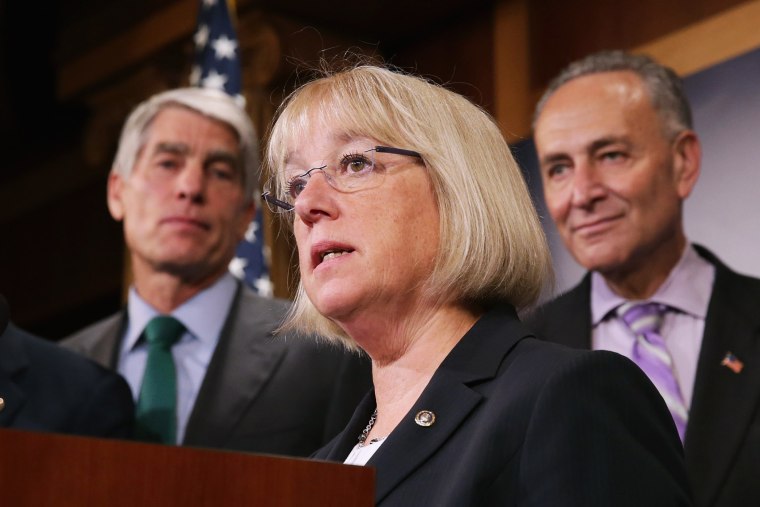Sen. Patty Murray (D-Wash.) has earned a reputation for being pretty mild-mannered, and we don't usually hear her publicly express frustrations with other policymakers. But yesterday, as the AP reported, even Murray found Donald Trump erraticism hard to take.
President Donald Trump is proving to be an erratic trading partner as he kicks thorny policy issues to Congress and then sends conflicting signals about what he really wants.His rapid backpedal on a short-term health care fix this week is the latest example to leave Republicans and Democrats alike scratching their heads."The president has had six positions on our bill," an exasperated Sen. Patty Murray, D-Wash., said Wednesday after Trump offered multiple reads on a bipartisan plan to keep health insurance markets in business, ultimately ending with a thumbs-down.
That's not much of an exaggeration. Over a brief period, the president was against, then for, then against, then for, then against a bipartisan agreement struck by Murray and Sen. Lamar Alexander (R-Tenn.). The deal, in which both sides benefit, seeks to undo much of the damage Trump himself imposed on the system.
Indeed, the president personally called Lamar Alexander two weeks ago to encourage him to strike this deal, and according to Trump, White House officials participated directly in the talks that produced the compromise --- which made it all the more curious when the president rejected the proposal (after supporting it, and opposing it, and, well, you get the idea).
Not to put too fine a point on this, but the core problem appears to be Donald Trump's profound confusion over the basics. The president has somehow convinced himself that insurers have "made a fortune" from cost-sharing-reduction (CSR) payments, which isn't at all true. He also seems certain that these CSRs represent a "bailout" of the insurance industry, which doesn't make any sense at all. Slate and Vox yesterday both described Trump's posture yesterday with the same adjective: "incoherent."
As a result of the fact that the president appears to have no idea what he's saying, Trump seems to swing wildly from one extreme to the next, with no real sense of where he wants to end up.
For those engaged in the policymaking debate, that's a problem -- but it may also be an opportunity. Jim Newell had a good piece yesterday, noting that the latest plan on Capitol Hill involves tricking Trump into thinking he's solved a problem.
[T]here is a tricky issue regarding 2018 insurance rates that Alexander-Murray grapples with. Since most insurers filed their 2018 rates at the end of September, and those rates were higher given the uncertainty surrounding the future of CSR payments, the bill devises a system to ensure that carriers wouldn't leave those inflated rates as is and pocket the CSR checks once the government resumes sending them. The discussion draft of Alexander-Murray, released late Tuesday night, requires states to explain how insurers would use those resumed payments to provide a "direct financial benefit" to consumers in 2018. Insurers could, for example, offer rebates to customers who enrolled in plans with inflated rates.The section dealing with this in the draft is in brackets, which means Murray and Alexander have not yet finalized it. Should Murray and Alexander choose to tighten the language further --superfluously, even -- Trump could come around to supporting the bill, arguing that they only changed it because he demanded they take a tougher line with insurers.
In fact, Lamar Alexander is already playing along, arguing yesterday that he and Trump actually want the same thing for the same reasons, even as the White House was expressing its opposition to Alexander's proposal.
The funny thing about ignorant officials is that they're sometimes easy to manipulate. For now, the Alexander-Murray agreement faces tough odds -- House Speaker Paul Ryan's (R-Wis.) opposition make success even less likely -- but given how frequently Trump has changed his mind, there's no reason to assume it can't be changed back.
